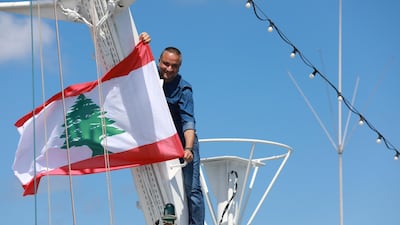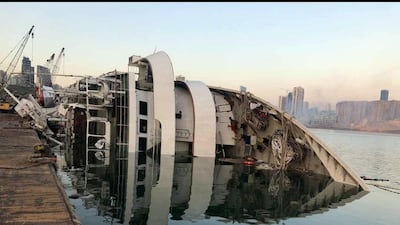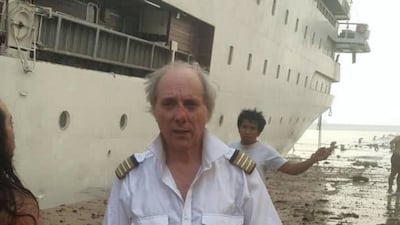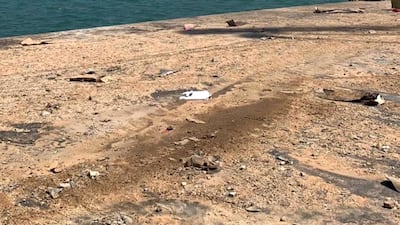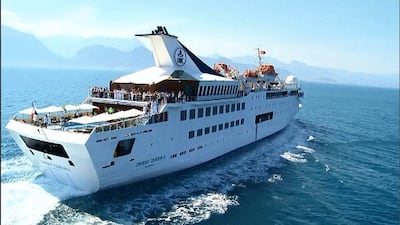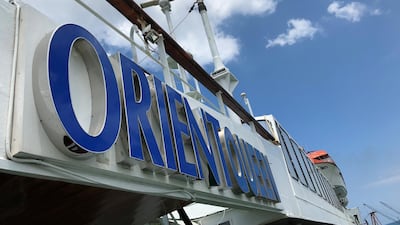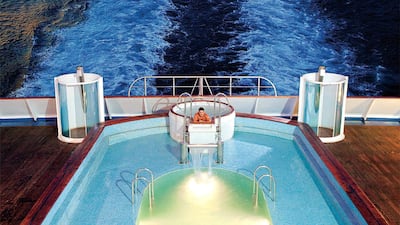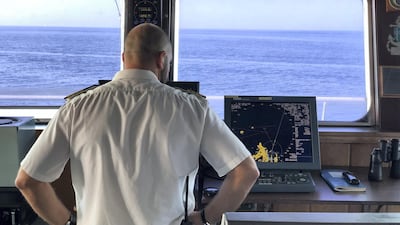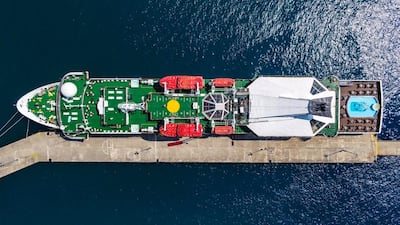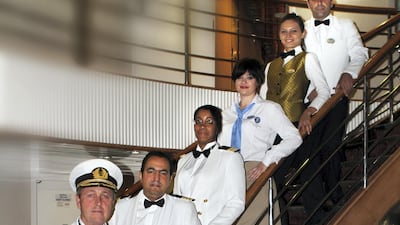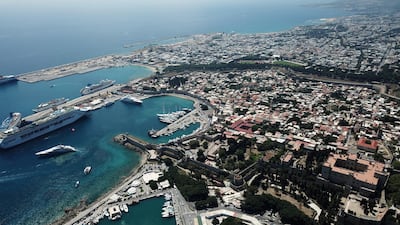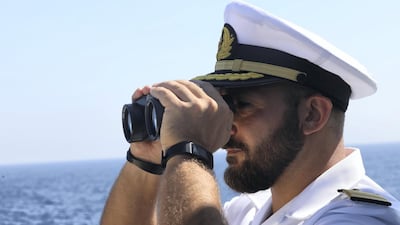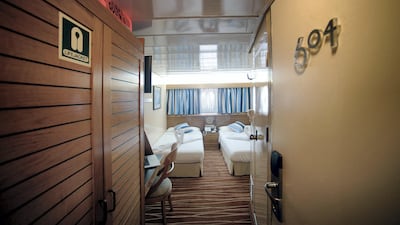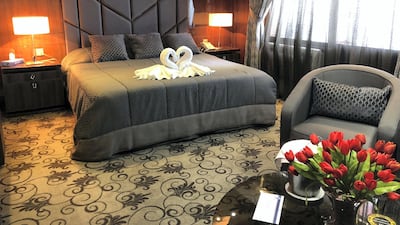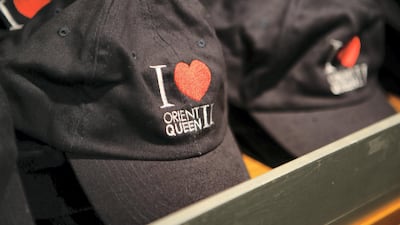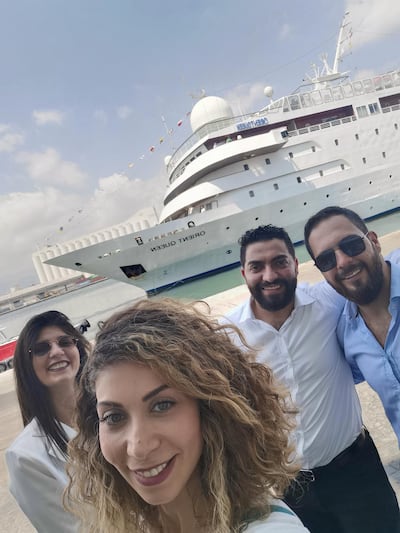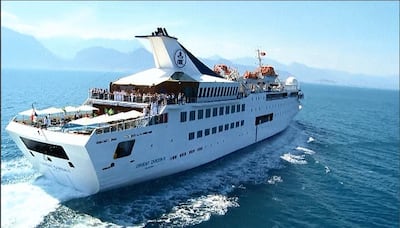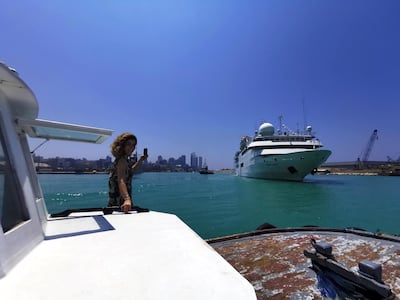"I remember when we used to sail into a port and the captain would honk the Orient Queen's horn. Standing near him on the bridge and hearing all the rest of the ships in the port honk back was something truly magical," says Hana Abou Merhi, chief operations manager of Abou Merhi Cruises.
The mother-of-two is recalling time spent on the five-star cruise ship, owned by her father's family business, which was docked at Beirut Port when the explosion hit on August 4. For Abou Merhi, it could have been much worse; she could have lost her life that day.
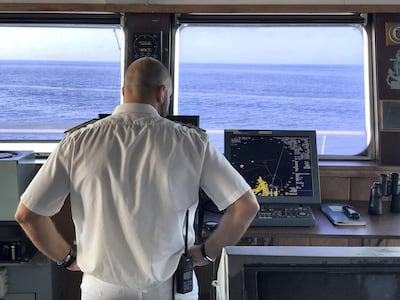
Responsible for the crew serving on the Orient Queen, Abou Merhi would usually have been aboard the ship as it rested at its home port. "As long as we have crew on board, I would always be around, but on that day I had already gone back to Saida, my home town, a little outside the city," she says.
Stopping at a shop close to her house, Abou Merhi was inside when she felt the first vibrations. "I felt the door of the store shaking and a sense of pressure; I started to panic," she says.
The elderly shopkeeper, blast-weary from decades of unrest in Lebanon, stood up and calmly told his customers "that's an explosion", before returning unruffled to his work.
As she left the store, her phone lit up with messages coming in from friends and family all over Lebanon. "Everyone was asking: 'Are you OK?', 'Did you feel it?', and at that point I was almost sure it was an earthquake since it had been felt across the country.
'There’s something happening at the port'
"I went into the house and my husband solemnly told me that something was happening at the port," she continues. Recalling this precise moment makes her heart race – the port was where the Orient Queen was docked.
Summer is Abou Merhi Cruises's busy season and their star player would usually have been at sea, perhaps sailing to Turkey, Cyprus or one of the Greek islands. As it was, on the day of the explosion, it remained grounded in Beirut.
This was owing to several factors, including the spiralling financial crisis in Lebanon and the onset of the coronavirus pandemic. "Having returned from her first expedition to Saudi Arabia in early summer, we decided that the ship would be put on hold for one year in the port until the following spring, when we hoped everything would be clear again," Abou Merhi explains.
In early August, the company was in the process of disembarking the crew, but the pandemic was causing delays. On August 4, 47 of the Orient Queen's 140-strong crew remained on board.
Checking her phone, Abou Merhi realised she had missed a text from Vincenzo Orlandini – the Orient Queen's hotel director. "There is a big fire near us. It looks dangerous," the text, which had been sent at 6.03pm, said.
Four minutes later, the first explosion occurred. About 30 seconds after that, a second blast erupted, sending a mushroom cloud into the air and shock waves across the country.
"I felt so guilty because I hadn't seen the text," says Abou Merhi, with tears in her eyes. "I tried to call him, but it was impossible to get a line with anyone in that area."
When she finally managed to connect with Orlandini, he told her there were several injured people on board the ship and there was no help on the way.
The hunt for the ship's crew
Emergency services were already responding to the explosion, but they were not getting close enough to the cruise liner, which, in a cruel twist of fate, was docked at Pier 11, right next to the explosion site, rather than at her usual base of Pier 5.
Abou Merhi shared the update with her father, who contacted a local television station to explain what was going on. In less than 10 minutes, three ambulances were on site at the cruise liner.
"The next challenge was to find out where people had been taken because they were evacuated barefoot, with no personal belongings. It was such a big explosion and we were so close to where it happened that only negative thoughts were going through my mind at this stage," recalls Abou Merhi.
She soon discovered that when the initial fire had ignited at the port, several of the crew had gone to the top deck to see what was happening. After the blast, these staff were nowhere to be found.
“We kept on searching, everyone was searching and after two and a half hours we found Heiley at a totally different pier.”
Blown from his spot on the ship's deck to the other side of the port, Heilemariam Reta – a long-standing member of the Orient Queen's crew – was found dead.
The Filipino embassy traced another two crew – they had been rescued from the water, having jumped off the ship when the explosion took place, hoping they would find respite in the sea.
Another member of staff who had also jumped ship was not so lucky. Mustafa Airout from Syria was missing for several days after the blast and the team feared the worst. These fears were confirmed when Mustafa’s father flew to Lebanon and submitted a DNA sample that health officials matched to the remains of the seaman’s body.
The walls crumpled like paper

Abou Merhi discovered that in the few seconds before the first flare-up, the ship was pulled towards the site of the blast and the ropes tethering it to the port snapped in two. The immense pressure of the second explosion then threw the ship in the opposite direction, where it smashed into the pier.
“All of the glass on the ship, from top to bottom, exploded. Inside, nothing was in its place – the ceilings collapsed, the electricity was down, even the safety firewalls made of metal crumpled as if they were pieces of paper.”
Given how close the cruise liner was to the blast, it is a miracle that the majority of its crew survived. Sadly, the same cannot be said for the ship itself.
When Abou Merhi and her team returned to the port the next day, they found water flowing into the ship's engine. And they could only stand by and watch as the 120-metre ship sank.
"The broken glass and open doors meant water flowed in even faster and she just started to go down. Technically, more than half of her is now underwater," says Abou Merhi.
More than six weeks after the blast, the ship remains belly up on the surface of the port and the damage looks irreparable.
This is not the end
But this is not a closed chapter, she says. "I don't see a bright immediate future, but this is a family dream and we won't let it end this way. I'm sure it's not the end of Abou Merhi Cruises.
"The Orient Queen is not just a piece of metal to me, instead she's something alive. She might be dark, cold and underwater now, but I have so many memories that will never fade away."
“Memories of happy families, children in the hallways, music, birthdays, anniversaries, proposals and the crew members uniting every summer. I have so many pictures of her on my phone, probably as many as I have of my own children.”
Since the blast, hundreds of passengers, crew members and clients have contacted the company, fondly recalling their time on board the cruise liner, sailing across the Levantine Sea and beyond.
Spurred on by these sentiments, Abu Merhi Cruises is committed to returning to sea. "I used to watch people disembarking and they wouldn't shake hands with the crew but instead give them hugs – this happiness was the goal. The ship was a way for us to introduce cruising to the Arabic market, in an Arabic version that they could be comfortable in. We had passengers from all over the region – from Syria, Jordan, Egypt, UAE and Kuwait and we will return," says Abu Merhi.
"The Orient Queen was the only cruise ship that had the Lebanese flag hanging on it and it can't end this way."
